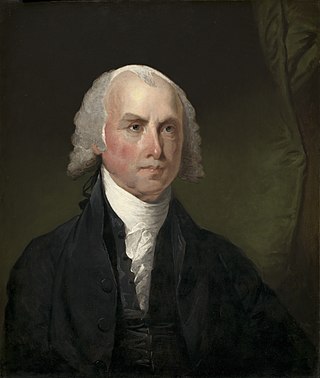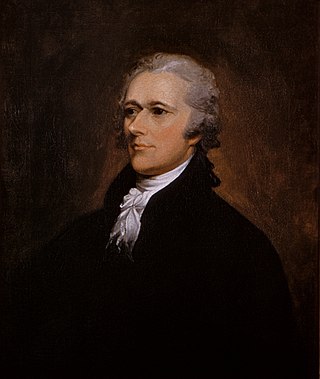
Federalist No. 23 is an essay by Alexander Hamilton, the twenty-third of The Federalist Papers. It was first published by The New York Packet on December 18, 1787 under the pseudonym Publius, the name under which all The Federalist papers were published. One of the more significant essays in the series, No. 23 attempts to justify the increased strength of the federal government under the proposed United States Constitution, compared to the then-active Articles of Confederation. The paper is entitled "The Necessity of a Government as Energetic as the One Proposed to the Preservation of the Union".

Federalist No. 17 is an essay by Alexander Hamilton, the seventeenth of The Federalist Papers. It was first published by The Independent Journal on December 5, 1787, under the pseudonym Publius, the name under which all The Federalist papers were published. No. 17 addresses the failures of the Articles of Confederation to satisfactorily govern the United States; it is the third of six essays on this topic. It is titled "The Same Subject Continued: The Insufficiency of the Present Confederation to Preserve the Union".

Federalist No. 24 is an essay by Alexander Hamilton, the twenty-fourth of The Federalist Papers. It was first published in The Independent Journal on December 19, 1787, under the pseudonym Publius, the name under which all The Federalist papers were published. It is titled "The Powers Necessary to the Common Defense Further Considered".

Federalist No. 25 is an essay by Alexander Hamilton, the twenty-fifth of The Federalist Papers. It was first published in The New York Packet on December 21, 1787, under the pseudonym Publius, the name under which all The Federalist papers were published. It continues the discussion begun in Federalist No. 24. No. 25 is titled "The Same Subject Continued: The Powers Necessary to the Common Defense Further Considered".

Federalist No. 30 is an essay by Alexander Hamilton, the thirtieth of The Federalist Papers. It was first published in the New York Packet on December 28, 1787, under the pseudonym Publius, the name under which all The Federalist papers were published. This is the first of seven essays by Hamilton on the then-controversial issue of taxation. It is titled "Concerning the General Power of Taxation".

Federalist No. 31 is an essay by Alexander Hamilton, the thirty-first of The Federalist Papers. It was first published in The New York Packet on January 1, 1788, under the pseudonym Publius, the name under which all The Federalist papers were published. This is the second of seven essays by Hamilton on the controversial issue of taxation. It is titled "The Same Subject Continued: Concerning the General Power of Taxation".

Federalist No. 32 is an essay by Alexander Hamilton, the thirty-second of The Federalist Papers. It was first published in The Independent Journal on January 2, 1788, under the pseudonym Publius, the name under which all The Federalist papers were published. This is the third of seven essays by Hamilton on the then-controversial issue of taxation. It is titled "The Same Subject Continued: Concerning the General Power of Taxation".

Federalist No. 35 is an essay by Alexander Hamilton, the thirty-fifth of The Federalist Papers. It was first published in The Independent Journal on January 5, 1788 under the pseudonym Publius, the name under which all The Federalist papers were published. This is the sixth of seven essays by Hamilton on the controversial issue of taxation. It is titled "The Same Subject Continued: Concerning the General Power of Taxation".

Federalist No. 34 is an essay by Alexander Hamilton, the thirty-fourth of The Federalist Papers. It was published on January 5, 1788 under the pseudonym Publius, the name under which all The Federalist papers were published. This is the fifth of seven essays by Hamilton on the then-controversial issue of taxation. It is titled "The Same Subject Continued: Concerning the General Power of Taxation".

Federalist No. 36 is an essay by Alexander Hamilton, the thirty-sixth of The Federalist Papers. It was first published in the New York Packet on January 8, 1788, under the pseudonym Publius, the name under which all The Federalist papers were published. This is the last of seven essays by Hamilton on the then-controversial issue of taxation. It is titled "The Same Subject Continued: Concerning the General Power of Taxation".

Federalist No. 52, an essay by James Madison or Alexander Hamilton, is the fifty-second essay out of eighty-five making up The Federalist Papers, a collection of essays written during the Constitution's ratification process, most of them written either by Hamilton or Madison. It was published in the New York Packet on February 8, 1788, with the pseudonym Publius, under which all The Federalist papers were published. This essay is the first of two examining the structure of the United States House of Representatives under the proposed United States Constitution. It is titled The House of Representatives".

Federalist No. 59 is an essay by Alexander Hamilton, the fifty-ninth of The Federalist Papers. It was first published by The New York Packet on February 22, 1788, under the pseudonym Publius, the name under which all The Federalist Papers were published. This is the first of three papers discussing the power of Congress over the election of its own members, the other two papers in this series being Federalist No. 60 and Federalist No. 61. The title of the paper is "Concerning the Power of Congress to Regulate the Election of Members".

Federalist No. 61 is an essay by Alexander Hamilton, the sixty-first of The Federalist Papers. It was first published by The New York Packet on February 26, 1788 under the pseudonym Publius, the name under which all The Federalist papers were published. This is the last of three papers discussing the power of Congress over the election of its own members. It is titled "The Same Subject Continued: Concerning the Power of Congress to Regulate the Election of Members".

Federalist No. 66 is an essay by Alexander Hamilton, the sixty-sixth of The Federalist Papers. It was published on March 8, 1788, under the pseudonym Publius, the name under which all The Federalist papers were published. The title is "Objections to the Power of the Senate To Set as a Court for Impeachments Further Considered".

Federalist No. 67 is an essay by Alexander Hamilton, the sixty-seventh of The Federalist Papers. This essay's title is "The Executive Department" and begins a series of eleven separate papers discussing the powers and limitations of that branch. Federalist No. 67 was published under the pseudonym Publius, like the rest of the Federalist Papers. It was published in the New York Packet on Tuesday, March 11, 1788.

Federalist No. 68 is the 68th essay of The Federalist Papers, and was published on March 12, 1788. It was probably written by Alexander Hamilton under the pseudonym "Publius", the name under which all of the Federalist Papers were published. Since all of them were written under this pseudonym, who wrote what cannot be verified with certainty. Titled "The Mode of Electing the President", No. 68 describes a perspective on the process of selecting the chief executive of the United States. In this essay, the author sought to convince the people of New York of the merits of the proposed constitution. Number 68 is the second in a series of 11 essays discussing the powers and limitations of the executive branch and the only one to describe the method of selecting the president.

Federalist No. 73 is an essay by the 18th-century American statesman Alexander Hamilton. It is the seventy-third of The Federalist Papers, a collection of articles written to promote the ratification of the United States Constitution. It was published on March 21, 1788, under the pseudonym Publius, the name under which all The Federalist papers were published. Its title is "The Provision For The Support of the Executive, and the Veto Power", and it is the seventh in a series of 11 essays discussing the powers and limitations of the Executive branch of the United States government.

Federalist No. 74 is an essay by Alexander Hamilton, the seventy-fourth of The Federalist Papers. It was published on March 25, 1788, under the pseudonym Publius, the name under which all The Federalist papers were published. Its title is "The Command of the Military and Naval Forces, and the Pardoning Power of the Executive", and it is the eighth in a series of 11 essays discussing the powers and limitations of the Executive branch.

Federalist No. 75 is an essay by Alexander Hamilton and seventy-fifth in the series of The Federalist Papers. It was published on March 26, 1788 under the pseudonym Publius, the name under which all The Federalist papers were published. Its title is "The Treaty Making Power of the Executive", and it is the ninth in a series of 11 essays discussing the powers and limitations of the Executive branch.

Federalist No. 77 is an essay by Alexander Hamilton, the seventy-seventh of The Federalist Papers. It was published on April 2, 1788, under the pseudonym Publius, the name under which all The Federalist papers were published. The title is "The Appointing Power Continued and Other Powers of the Executive Considered", and it is the last in a series of 11 essays discussing the powers and limitations of the Executive Branch.



